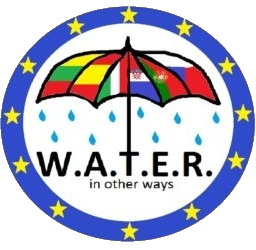Summary
The project entitled “W.A.T.E.R. – in other ways” will be implemented by students of six partner schools from: Czech Republic, Croatia, Lithuania, Spain, Portugal and Italy. This project stems from the environmental experiences of all participating schools and the main objective is to expand their knowledge and exchange good practices in this field to achieve greater competences needed in daily life in 21st century.
The project is divided into 5 areas:
W = THE WAR OF SURVIVAL (do we have enough drinking water for all of us?)
A = ALTERNATIVE RESOURCES (energy – disastrous or useful)
T = TRANSPORT AND TRAVELLING (ships, ferry, freight, sea and river)
E = ECOLOGY (pollution and protection, water capture, purification)
R = RECREATION AND REMEDY (water sports, theme parks, mineral water, healing)
Each area represents one meeting in a partner country building on the results of the activities that always precede this meeting, and is complemented by a meeting in a partner country aiming to familiarize all project partners.
The partner schools will communicate in English. The target groups of our project are: the students of all classes aged 6 to 15, among them students from disadvantaged backgrounds, but also parents, teachers and local community, institutions and companies. 600 students aged 11-15 together with 600 pupils aged 6-10 will be involved in activities throughout a twenty-four months lasting project within the framework of transnational cooperation
The specific objectives of the project are:
• show students different approaches in a water consumption and a different price of water in all participating schools and impact on their lives by improving their financial and maths competences
• improve awareness about water from all aspects and angles not only for students but also for family relatives and a local community
• students and families will acquire the knowledge and experience with better environmental approach by participating in this project
• connect the curricula of different subjects by implementing project and involving all teachers, to develop an interdisciplinary knowledge
• students will become familiar with procedures for saving lives, drowning people – 1st aid
• all students will realize the importance of belonging to the EU by participating in this project and by cooperating with different nations
• increase openness of students to other cultures, enable students to formal and informal contact with foreigners
• increase competence in the use of English language and ICT and (digital competences) for students and teachers
• Increase recognition of schools in the local environment etc.
In the framework of the project there are following activities planned: short-term exchanges of group of students, measuring and calculation of water consumption, introducing technical measures to save water, mapping of watercourses (a map creation), production of a water mill with connection to a simple electric circuit and its functioning, photography and drawing of water by the eyes of children (water disasters, waterworks of energy), memory game creation, learning about 1st aid on water, learning about the importance of water transport, creation of rainwater meter and use of captured rainwater, learning about water cycle in nature, mapping of mineral springs, creation of atlas of aquatic animals, dramatization of fairy tale about water, dictionary creation.
In our project we plan to use the following methodology and pedagogical approach: learning through experience, experimentation, mathematical processing of results from research, videoconferences and by educational games, stimulating creativity through educational trips, visits and excursions to several different institutions.
We expect to achieve the following results during the project: 12 presentations about participating countries and schools, 36 presentations related to water (water consumption, water resources, rainfall measurements, rainwater creation, watermill production, waterworks of energy, water transport, mineral springs), project logo, calendar, web pages, leaflet 1st aid on water, 6 maps, 6 watermills, 2 magazines, 2 art exhibitions, photo album, memory game, atlas of aquatic animals, drama performance, 3 videoconferences, dictionary about water sayings.
We expect the following impact and benefits in the long term: the increased interests of students in environment, the increased tolerance to social and cultural differences, the increased willingness of teachers to take on new challenges and projects, the increased openness of the teachers to educational cooperation, perception of the teaching staff as active and involved in lives of local people, the use of effective solutions to reduce socio – economic differences between disadvantaged students, improved educational offer of the schools, the increased experience in implementation of EU projects, the opportunity to use examples of good practices by other organizations.

